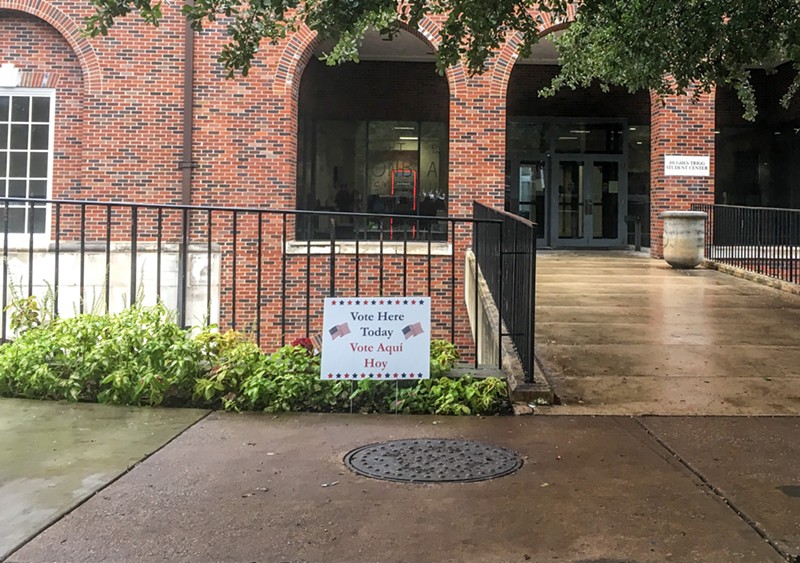Critics say these moves are designed to suppress liberal votes. About 67% of people ages 18-29, a demographic that includes college students, voted for Democratic candidates in 2018, according to the Pew Research Center.
While attempts by Texas Republicans to hinder voting are nothing new, Glen Maxey, legislative affairs director for the Texas Democratic Party, said a law passed by the Republican-controlled Texas Legislature and signed by Gov. Greg Abbott in June targets college campus voting arrangements, as well as access to polls for people who live far from polling stations.
Valerie Maniscalco, a graduate student at Southern Methodist University, has voted in every election since she was 18. For her, it's part of her duty as an American citizen to participate in the democratic process, not only so that she can have a say, but because people in many other countries don't have the option to vote or to vote freely, she said.
In 2018, the Tufts study showed, 40.3% of college students voted, up from 19.3% in 2014. United States census numbers indicated that young voters, those ages 18-34, tend to vote in much smaller numbers than the general population. From 2004 to 2014, as few as 16.2% and as many as 24.4% of this demographic cast votes.
But now, students have more ways to gather information and it makes sense to Maniscalco that students are voting in greater numbers.
“We just want to be a part of the process,” she said.
The new Texas law requires early voting stations to be open for the full 12 days of the early-voting window. An estimated 38% of Dallas and 39% of Tarrant County voters cast their votes during early voting in 2018, according to the Texas Secretary of State’s office.“We just want to be a part of the process." — Valerie Maniscalco
tweet this
Before the law passed, county clerk offices operated mobile voting stations, which could travel to people who otherwise might not be able to vote — college students without cars, elderly citizens or people who lived in remote parts of the state, for example. These stations could be in one place for a few days and then move on.
In many locations that mobile voting booths traveled to, only a few days were needed for all the area’s voters to cast their ballots, Maxey said. Requiring these stations to be open and immobile for the entire 12-day period means that some places' stations will not be open at all and others will be operational for much longer than necessary.
The bill was proposed to combat unethical voting practices and voter fraud. But the response by lawmakers went way too far and is affecting many people, Maxey said.
Amendments that would have made exceptions for some of the voter populations that would be most affected were rejected. Even when Maxey pointed out that the law would hurt rural voters, many of whom support Republican candidates, he was ignored, he said.
Most of those representatives don’t come from rural areas and don’t understand how complicated it might be for people to travel 40 or even 100 miles to vote, Maxey said.
Since 2013, when the Supreme Court overturned a key provision of the 1965 Voting Rights Act, polling stations around the country have closed. That trend hampers access to voting, especially for people with limited mobility. It also disproportionately affects people of color, according to a report released last month by the Leadership Conference Education Fund.
The Voting Rights Act required, in part, that states with a history of voter discrimination must acquire pre-approval before making any changes to their voting laws or practices. The Supreme Court majority opinion held that this requirement was unconstitutional, because the data about which states had to comply was more than 40 years old.
In Texas, 750 early-voting sites and election-day polling stations have closed, including 590 stations since the 2014 election. That's more than in any other state, the Leadership Conference Education Fund report said. In Dallas County, 74 stations have closed, and 27 in Tarrant County are now out of service.
“Though not inherently discriminatory, these polling place closures occurred in states and localities with past histories of racial discrimination in voting. And some took place amid a larger constellation of efforts to prevent voters of color from electing the candidates of their choice, such as enactment of stricter voter identification laws, restrictions on voter registration, and voter purges,” the report said.
The New York Times reported that the new Texas law has resulted in the closure of six polling sites on Fort Worth college campuses. But that's not accurate, said Tarrant County spokesman Bill Hanna and Tarrant County Judge Glen Whitley. In midseason elections, when there are only issues on the ballot, not people running for office, Tarrant County doesn't normally have polling places on college campuses at all. Polling stations that would not have been there in the first place can't be considered closed this year.
But last year there were several polling stations on Tarrant County college campuses, not the entire 12-day early voting period, Whitley said. The county will need a new plan for those stations in the 2020 election.
Currently, the Tarrant County Commissioners Court is leaning toward funding stations on college campuses, Whitley said.
“We want to encourage as many people to vote as we can,” he said.
But he also emphasized that he does not want to waste taxpayer money. If Tarrant County elects to have those polling stations on college campuses full time next year, it will be important to see how much they get used.
This year, both Tarrant and Dallas counties switched to polling centers for election day. Now voters can vote anywhere, not just at their precinct. Whitley is hopeful that this will make it easier for voters to cast their ballots.
“That's a move toward voter access,” Hanna said.
Dallas County elections administrators could not be reached for comment.
Since 2014, nationwide voter turnout has increased from 41.9% to 53.4%. Among voters ages 18-29, turnout climbed from 20% to 36%, the largest increase in any voting demographic, according to the United States Census Bureau.
Polling stations on campuses make it easier for students to vote, because they do not have to go out and search for a place to vote or return to their home precincts. Students also have a lot more access to information than they used to. Now, there is a wide amount of information available through simple Google searches, said Maniscalco, the SMU student.
“It's just easier to understand what's going on … and that makes for a more informed voter,” she said.













